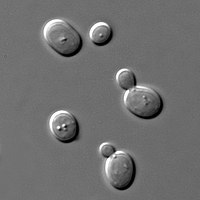
Photo from wikipedia
This work was performed to verify the potential of yeast strains isolated from cachaça distilleries for two specific biotechnological applications: beer and bioethanol production. In the beer production, the strains… Click to show full abstract
This work was performed to verify the potential of yeast strains isolated from cachaça distilleries for two specific biotechnological applications: beer and bioethanol production. In the beer production, the strains were tested for characteristics required in brewery practices, such as: capacity to ferment maltose and maltotriose, ability to grow at lowest temperatures, low H2S production, and flocculation profile. Among the strains tested, two of them showed appropriate characteristics to produce two different beer styles: lager and ale. Moreover, both strains were tested for cachaça production and the results confirmed the capacity of these strains to improve the quality of cachaça. In the bioethanol production, the fermentation process was performed similarly to that used by bioethanol industries: recycling of yeast biomass in the fermentative process with sulfuric acid washings (pH 2.0). The production of ethanol, glycerol, organic acids, dry cell weight, carbohydrate consumption, and cellular viability were analyzed. One strain presented fermentative parameters similar to PE2, industrial/commercial strain, with equivalent ethanol yields and cellular viability during all fermentative cycles. This work demonstrates that cachaça distilleries seem to be an interesting environment to select new yeast strains to be used in biotechnology applications as beer and bioethanol production.
Journal Title: Antonie van Leeuwenhoek
Year Published: 2018
Link to full text (if available)
Share on Social Media: Sign Up to like & get
recommendations!